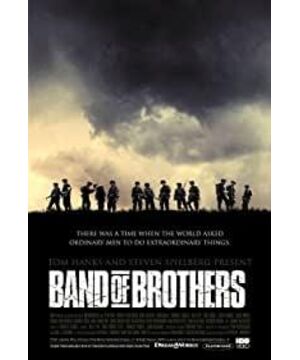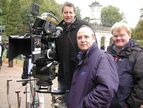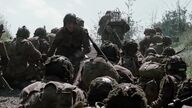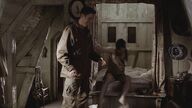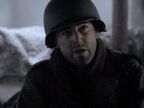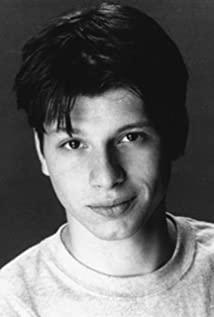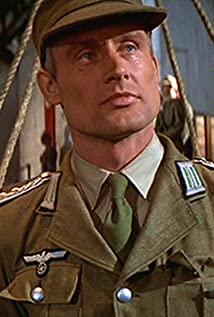In the first episode, the opening chapter uses the memories and narratives of several veterans. Throughout the whole play, the extremely real human psychology presented in this segment sets the tone for the whole play-although it is from the US side to tell the history , But absolutely does not hold any subjective color, and strive to restore that period of history with the most realistic environment and character psychology. In the opening narration, an veteran said directly: When everyone heard what happened to the paratroopers, they all said that they were going to die, but when they said that the allowance for paratroopers was 50 dollars more than that of ordinary soldiers, I raised my hand. NS.
The first episode mainly explained the early events of the whole play, from the recruit training to the paratroopers boarding the C47 in the UK and heading to Normandy to start the war.
David Schwimmer, who performed well in the hit sitcom "Friends", played a more important role in the first episode. The company’s commander, Sober, is a harsh, strict, and extremely stupid guy who has no mercy on soldiers and is extremely stupid in actual combat. Strictly what we see in the original work may be the same as critical and self-righteous as a military instructor in all American movies. Those almost tortured training schedules and requirements in the movie suddenly become a kind of cruelty, but there are too many movies of the same type. , And the performance in the show has a lot of homage to "Full Metal Shell", but it is hard to surpass it. It is wonderful, but due to the limitations of the various characteristics of the TV show itself, it cannot be said to be too brilliant. The annoying Sober is a very interesting image, it will feel at first, David Schwimmer's natural kind tone and those pair of cute big eyes that no one can match to play such a perverted instructor is a bit wrong, but when After the plot went on, after Sober's style and human weakness were exposed, the contradiction of this character was formed-he just strictly required his subordinates to make them more able to bear hardships and stronger. All he can do is use His own power forced them to do this. Although the soldiers did not appreciate him and eventually impeached him, in future wars, no one can ignore the physical and psychological endurance that he gave soldiers during the training to be suitable for the war environment. David Schwimmer's performance when he was told that he would be transferred from the company was almost a return to the lovable and pitiful Ross in "Friends", with teary eyes like small creatures and instantly acted out the role that has always been disgusting. With life, let this character begin to plump and complete.
In this episode, the protagonist group of the story began to form. The main characters in the E company range from the company commander to the soldier. For the first time, each of the vivid and individual characters showed their own character. It is only because of the training camp that everyone is only limited. In the plot of complaining and rebellion, he spoke and made scenes that were in line with the character’s personality, and the later episodes came to the battlefield. In the hell where there is no human nature, everything will happen, people’s kindness, evil, strong, weak, cowardly, united and selfish psychology will be Constantly appearing and changing, this aspect of the first episode is just the end.
After all, it is the director and senior actor of the big scene commercial film. Of course, Tom Hanks and Spierburg will not let this TV series continue the slow pace of the American war film, and delete many dispensable events, especially the habitual lyrical link. The entire episode has a tight narrative rhythm and a wide range of aspects. Under this framework, the characters’ movements and conflicts fill the gaps, and the psychology before the war comes is always grasping the hearts of the audience, plus a few just right humor points, one The works made with TV dramas as movies began to show their splendor slowly under the hands of a group of strong and meticulous people. Even just one episode is a complete plot, which is independent and can lead to subsequent stories. From the scene, the director deliberately used the "mind" consciousness of the movie to shoot. The whole episode often uses big panoramas and small characters. The middle shot often used in TV dramas is not the protagonist. In the movie, there is nothing wrong with this shooting method. In the TV series, this technique also enriches its connotation. It is said that innovation is not counted as, but it can be said that it is a very successful consciousness and application.
In terms of color, military green may have always been desirable, but it would be a bit boring to stare at the same uniform for an hour. In fact, the uniforms of the soldiers in the first episode should be ordinary training uniforms—training undershirts in chronological order. Shorts-field training uniforms-paratroopers uniforms-paratroopers field uniforms (well, it’s been too long since it has been out of professional military magazines, it’s not as smooth as before), although insiders know that these uniforms have been replaced several sets in different environments and different occasions, But for ordinary audiences, they don’t understand so much military knowledge. The director used strong contrast to make up for this weakness, avoiding many military-themed film and television works of dim color aesthetics and long-term fatigue. By the way The reason why our "Bright Sword" looks good is also for this reason. It even uses filters of various tones to distinguish between different camps-the Eighth Route Army’s warm blue, the KMT’s ordinary blue, and the Japanese army’s cool yellow. First of all It is to distinguish their respective factions. Secondly, in this big environment, the audience can quickly make a role change from the color tone in the scene change, and finally solves the problem of aesthetic fatigue. If you don’t believe it, look at it, the sky of the Eighth Route Army is blue. God, the sky of the Japanese devils is khaki. Far away, the method of "Brothers" is not as obvious as "Bright Sword", but the contrast is increased on the same lens and the light is used rationally, so we can often see beautiful halos appearing in the lens, which can be regarded as a very Aesthetic war film technique.
In general, the first episode laid a good foundation for the plot later, and a traditional suspense gimmick at the end, but this suspense exists in the last 9 episodes, not the last one or two episodes of ordinary TV series. When you have not entered the fighting environment, you will be sold out, so that all those who know history and try to understand this period of history are full of expectations.
After that, the review will keep up, thank you for reading!
View more about Band of Brothers reviews


